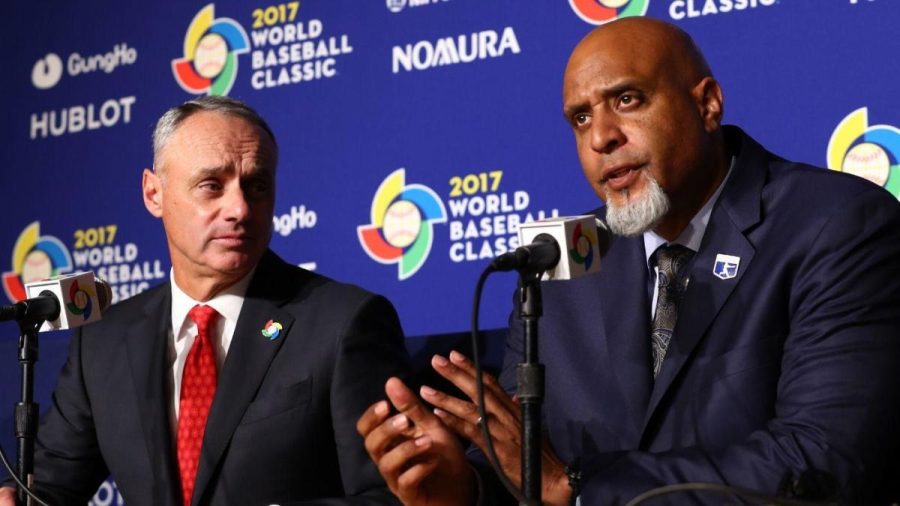The MLB Lockout
MLB Commissioner Rob Manfred (Left) and Executive director of the MLBPA Tony Clark (Right) talk to the press at the 2017 World Baseball Classic
March 1, 2022
As of 2/23/22, Major League Baseball is currently in a lockout. With the lockout instituted, baseball has had little-to-no news coming from Major League free agency, trades, communication between clubs, club-player, club fans, and a lot more that I will get into later in the article.
A lockout like this happens when a collective bargaining agreement (CBA) between the Major League Baseball owners and the Major League Baseball Players Association (MLBPA) expires, leaving no physical rulebook for them to play on. A CBA is essentially the rulebook of the MLB. It goes into detail about everything from the equipment umpires are allowed to wear, the minimum salaries for players, the playoff format, and almost everything in between. CBAs are normally set for 20-25 years at a time, but given that this is the league’s first labor stoppage since ’94-’95, there is obviously some ground separating the players from the owners — differences that need to be solved as soon as possible to have a season on time.
Although the lockout was instituted to “jump-start negotiations” (quote from Commissioner Rob Manfred), there could have been another option instead of locking out players. One of three things happens with a CBA expiration. Option A: the owners/commissioner lockout the players (what is happening now). Option B: the owners agree to play under the previous CBA and the regular MLB calendar continues. Option C: the owners agree to play under the old CBA and the players strike. Commissioner Manfred and the owners went with option A, forcing a labor stoppage for only the eighth time and an owners’ lockout for the third time in the history of the MLB.
The players’ association (led by Executive Director Tony Clark) wants players to be paid earlier in their career, free agent compensation to be a thing of the past, and several other issues to be addressed before a new CBA is agreed upon. The issue with the players is that their leverage to get a deal that’s beneficial to them ran out weeks ago. With a reduced 162 game season, players won’t be paid their full salaries and no games will be made up or rescheduled, so the longer the lockout continues and the longer it takes for the players to reach a deal, the more money is lost by players.
The owners (led by Commissioner Rob Manfred) want salaries to continue to be flat — they don’t really care how or how early players get paid. The owners simply want more money for themselves. They typically achieve this goal through expanded playoffs (which gain revenue), lowering the CBT (a.k.a. luxury tax), and keeping minimum salaries as low as reasonably possible. They also want an international draft, as well as several other things. In my opinion, they have a lot more leverage than the players, given that most of their net worths are in the billions (their average net worth is $3.12 billion) and they can take hits of losing money like this lockout is going to cause. However, like the players, the owners will lose more money the longer the lockout goes on.
The deadline for a deal to happen for a full 162 to occur is 2/28/22 (extended to March 1st at 5 pm), leaving less than a week for the MLB and the MLBPA to sign off on a new CBA for a full season to happen. This means when the deadline set by the MLB is passed and no CBA is agreed upon, the MLB will begin canceling games that will not be made up and that players will not be compensated for. While the livelihood of the players is at stake, fans just want to watch baseball and could care less about the fine print. Fans have been starved from any baseball for a month-and-a-half before negotiations even took place, for crying out loud. The fans want baseball, the players want fairness for all players, and the owners want money.


